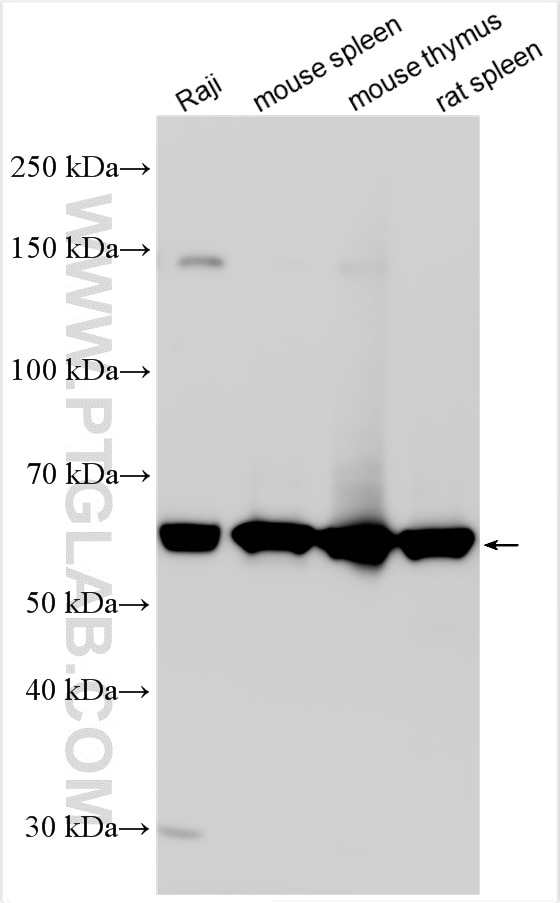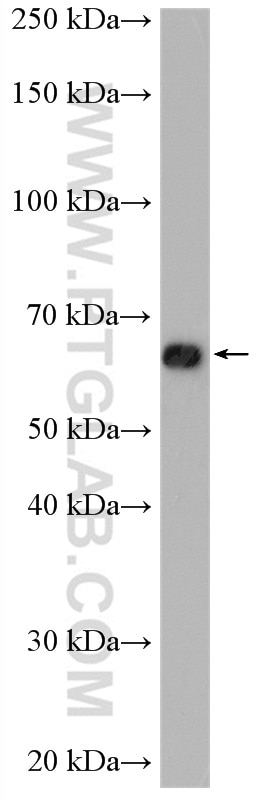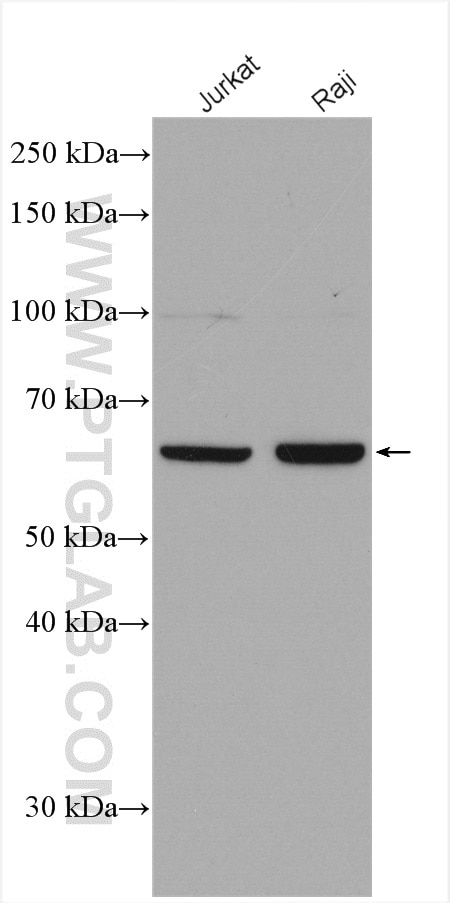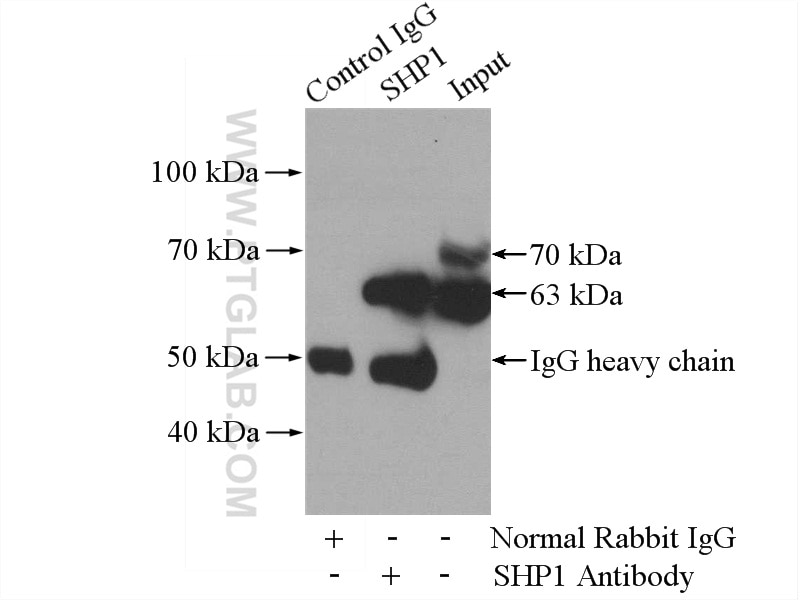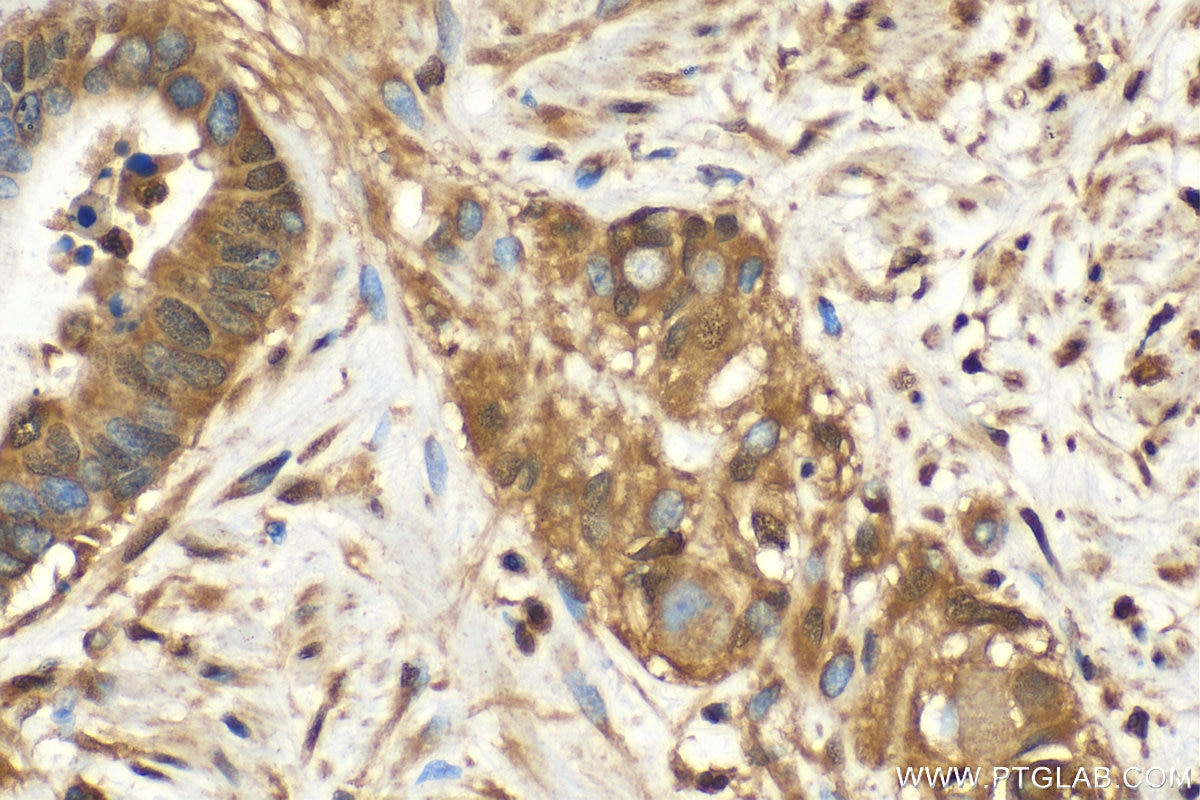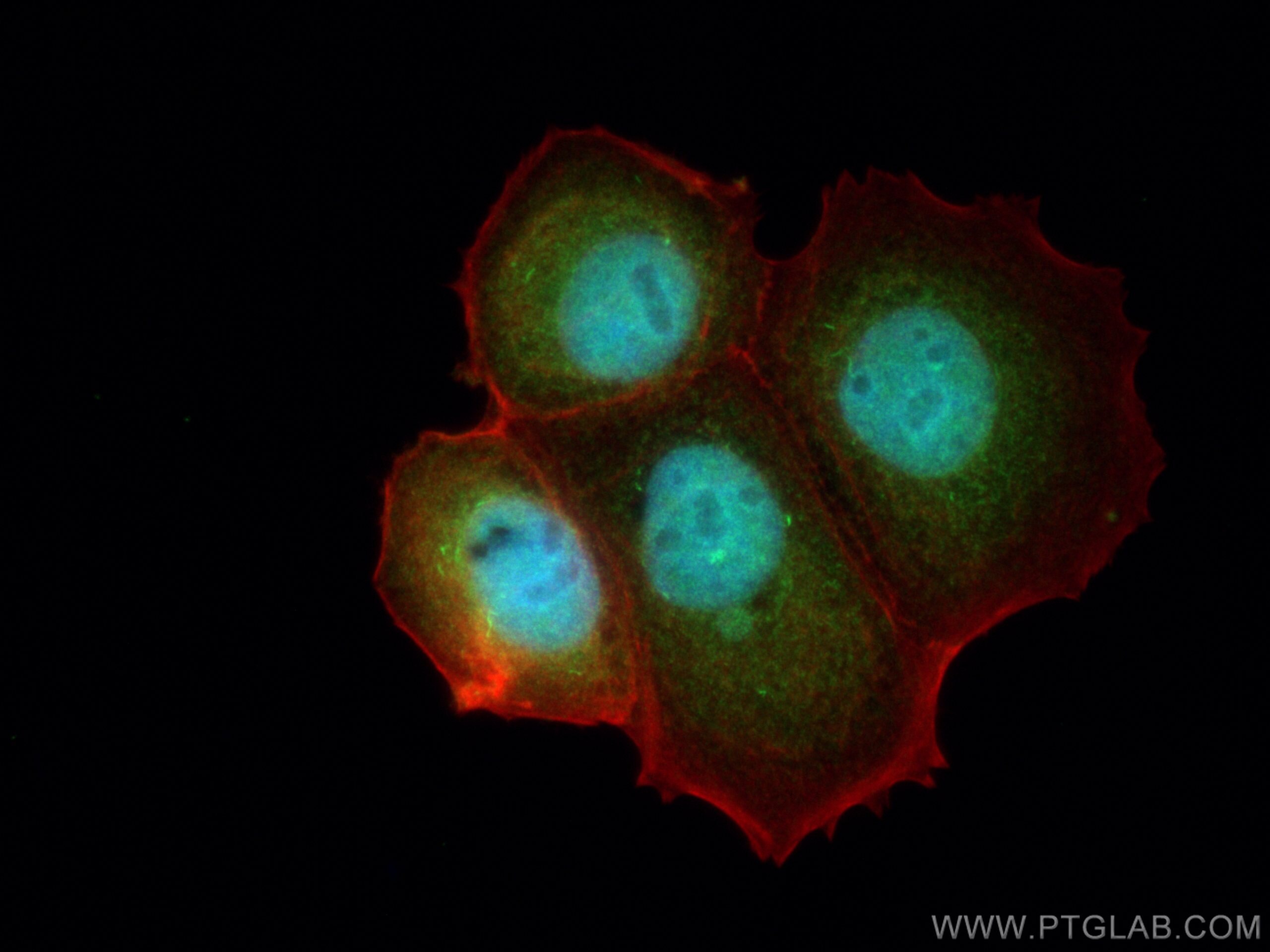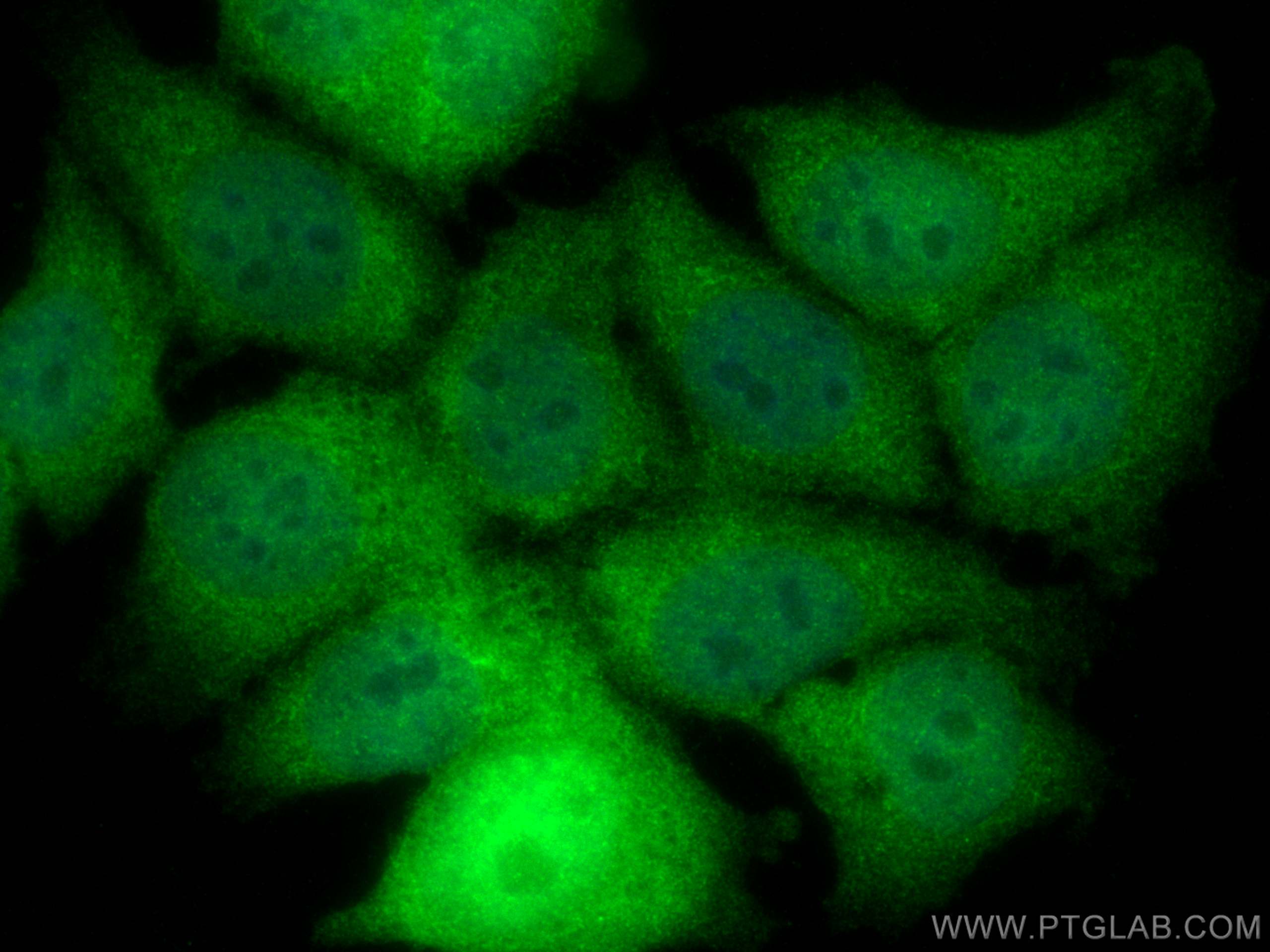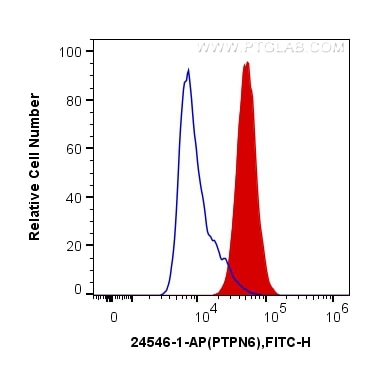- Phare
- Validé par KD/KO
Anticorps Polyclonal de lapin anti-PTPN6
PTPN6 Polyclonal Antibody for WB, IHC, IF/ICC, FC (Intra), IP, ELISA
Hôte / Isotype
Lapin / IgG
Réactivité testée
Humain, rat, souris
Applications
WB, IHC, IF/ICC, FC (Intra), IP, CoIP, ELISA
Conjugaison
Non conjugué
N° de cat : 24546-1-AP
Synonymes
Galerie de données de validation
Applications testées
| Résultats positifs en WB | cellules Raji, cellules HuH-7, cellules Jurkat |
| Résultats positifs en IP | cellules Jurkat |
| Résultats positifs en IHC | tissu de cancer du côlon humain, il est suggéré de démasquer l'antigène avec un tampon de TE buffer pH 9.0; (*) À défaut, 'le démasquage de l'antigène peut être 'effectué avec un tampon citrate pH 6,0. |
| Résultats positifs en IF/ICC | cellules MCF-7, |
| Résultats positifs en FC (Intra) | cellules MCF-7 |
Dilution recommandée
| Application | Dilution |
|---|---|
| Western Blot (WB) | WB : 1:5000-1:50000 |
| Immunoprécipitation (IP) | IP : 0.5-4.0 ug for 1.0-3.0 mg of total protein lysate |
| Immunohistochimie (IHC) | IHC : 1:50-1:500 |
| Immunofluorescence (IF)/ICC | IF/ICC : 1:50-1:500 |
| Flow Cytometry (FC) (INTRA) | FC (INTRA) : 0.20 ug per 10^6 cells in a 100 µl suspension |
| It is recommended that this reagent should be titrated in each testing system to obtain optimal results. | |
| Sample-dependent, check data in validation data gallery | |
Applications publiées
| KD/KO | See 1 publications below |
| WB | See 15 publications below |
| IHC | See 1 publications below |
| IF | See 2 publications below |
| IP | See 2 publications below |
| CoIP | See 2 publications below |
Informations sur le produit
24546-1-AP cible PTPN6 dans les applications de WB, IHC, IF/ICC, FC (Intra), IP, CoIP, ELISA et montre une réactivité avec des échantillons Humain, rat, souris
| Réactivité | Humain, rat, souris |
| Réactivité citée | Humain, souris |
| Hôte / Isotype | Lapin / IgG |
| Clonalité | Polyclonal |
| Type | Anticorps |
| Immunogène | PTPN6 Protéine recombinante Ag21415 |
| Nom complet | protein tyrosine phosphatase, non-receptor type 6 |
| Masse moléculaire calculée | 597 aa, 68 kDa |
| Poids moléculaire observé | 63 kDa |
| Numéro d’acquisition GenBank | BC002523 |
| Symbole du gène | PTPN6 |
| Identification du gène (NCBI) | 5777 |
| Conjugaison | Non conjugué |
| Forme | Liquide |
| Méthode de purification | Purification par affinité contre l'antigène |
| Tampon de stockage | PBS avec azoture de sodium à 0,02 % et glycérol à 50 % pH 7,3 |
| Conditions de stockage | Stocker à -20°C. Stable pendant un an après l'expédition. L'aliquotage n'est pas nécessaire pour le stockage à -20oC Les 20ul contiennent 0,1% de BSA. |
Informations générales
PTPN6(Tyrosine-protein phosphatase non-receptor type 6) is also named as HCP, PTP1C and belongs to the protein-tyrosine phosphatase family. It regulates muscle INS action in a cell-autonomous manner, further suggesting that the PTPase negatively modulates INS action through down-regulation of both INS signaling to AKT1 and SLC2A4 translocation, as well as SLC2A4 expression(PMID:21952243). It has 4 isoforms produced by alternative splicing.
Protocole
| Product Specific Protocols | |
|---|---|
| WB protocol for PTPN6 antibody 24546-1-AP | Download protocol |
| IHC protocol for PTPN6 antibody 24546-1-AP | Download protocol |
| IF protocol for PTPN6 antibody 24546-1-AP | Download protocol |
| IP protocol for PTPN6 antibody 24546-1-AP | Download protocol |
| Standard Protocols | |
|---|---|
| Click here to view our Standard Protocols |
Publications
| Species | Application | Title |
|---|---|---|
Elife Molecular features underlying differential SHP1/SHP2 binding of immune checkpoint receptors. | ||
Oncotarget Dietary quercetin potentiates the antiproliferative effect of interferon-α in hepatocellular carcinoma cells through activation of JAK/STAT pathway signaling by inhibition of SHP2 phosphatase. | ||
Front Immunol Host MKRN1-Mediated Mycobacterial PPE Protein Ubiquitination Suppresses Innate Immune Response.
| ||
Oxid Med Cell Longev Proscillaridin A Promotes Oxidative Stress and ER Stress, Inhibits STAT3 Activation, and Induces Apoptosis in A549 Lung Adenocarcinoma Cells. | ||
J Biol Chem A thiazole-derived oridonin analog exhibits antitumor activity by directly and allosterically inhibiting STAT3. |
